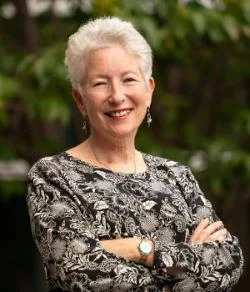You wouldn’t guess by looking at her, but Dorothy Farrar Edwards, PhD, has battled hypertension most of her life. Despite a trim physique and a low-key manner, a family history of heart disease and hypertension claimed her brother at a young age, and both of her parents.
“I lost my brother at age 43 to heart disease, which is way too young,” she reflects. “I have hypertension and have felt, for a long time, that my family’s genetics are likely a major factor. This helped to shape my entire professional career.”

A professor in the Department of Medicine at the University of Wisconsin School of Medicine and Public Health and in the Department of Kinesiology at the UW–Madison School of Education, Farrar Edwards has focused her research on investigating the cultural, physical, genetic and lifestyle factors that lead to a wide range of health conditions that have disparate effects on different populations. Her current investigations have the goal of advancing health equity by addressing health disparities, particularly focusing on Alzheimer’s disease and stroke in African American populations.
As director of the Collaborative Center for Health Equity in the UW–Madison Institute for Clinical and Translational Research she has contributed to significant advances in the care of minority, immigrant and tribal communities in Wisconsin, but says there’s a long way to go. This is among the reasons she advocated for UW–Madison to engage in the All of Us Research Program.
A historic effort to make a positive impact on health and health disparities nationwide, the All of Us Research Program is funded by the National Institutes of Health (NIH). The NIH chose the Wisconsin consortium — comprised of UW–Madison, Marshfield Clinic, the BloodCenter of Wisconsin and the Medical College of Wisconsin — as one of 10 participating centers nationwide.
Extending the Wisconsin Idea
Farrar Edwards and Elizabeth Burnside, MD, associate dean for team science and interdisciplinary research at the School of Madison and Public Health, serve as co-principal investigators for UW–Madison’s site. Farrar Edwards also leads community engagement for the statewide All of Us Wisconsin consortium. She lauds the program as “exciting, innovative and ambitious,” with the mission of creating the largest biobank of its kind by collecting health data from a million or more participants nationwide. She says the program illustrates UW–Madison’s long-term commitment to health equity.
“I see this as an extension of the Wisconsin Idea,” she says. “We, at UW–Madison, aim to bring our knowledge to the benefit of the people in Wisconsin and beyond. We are committed not only to health equity, but to making major advances in health research. We’re an appropriate institution to do this, it’s in our DNA, so we were willing to jump in and accept the challenge to work on All of Us.”
The program is part of the Precision Medicine Initiative. Taking into account individual factors like where people live, what they do and their family health history, precision medicine techniques help health care teams make tailored recommendations to specific people of different backgrounds, ages or regions, and share ways for people to stay healthy. It also addresses ways in which medicine can be costly — in time, money and health — for patients, providers and researchers.
“Precision medicine is important because we want to make sure everyone has access to the best possible care for health problems they have,” Farrar Edwards declares.
Strengthening the Science
A major aim of All of Us is to ensure the inclusion of populations that are too often missing in health research, and which reflect the full diversity of the United States. The program welcomes healthy and sick participants of all backgrounds and walks of life, and from all regions of the nation.
“Chronic disease falls disproportionately on communities of color and members of under-represented groups, and we don’t know why,” notes Carey Gleason, PhD, MS, Wisconsin Alzheimer’s Disease Research Center, and a co-leader of the Minority Recruitment Satellite Program with Farrar Edwards. “We need to be able to better diagnose, treat and protect people from serious disease and disabling conditions, but to do this, we need to have data from the people who are at the greatest risk. The All of Us Program is designed to do that.”
Participants are asked to share their electronic health records and answer questions about their health habits and their home and work life. Some will be asked to have their physical measurements taken and to provide blood and urine samples, and these participants will be offered a one-time compensation of $25. Participants will have online access to their health data with the option of sharing the information with their health care provider, if they choose to do so.
“Information from all of these types of data can provide an important, in-depth picture of characteristics, health conditions and biologic information that might point to new treatments or special risk for certain conditions,” Farrar Edwards says.
Safeguarding Privacy
Given that All of Us is collecting sensitive health information on a massive scale, data security is paramount. To protect the personal data that participants give to the program, it follows strict security protocols, including security requirements for partner organizations that collect, transfer or store information, and thorough screening of researchers who seek access to the data.
Although there is a certain amount of risk involved in participating in any research project, given the privacy safeguards, Farrar Edwards believes the positive impacts of the All of Us Program outweigh the limited risk.
“I signed up as an All of Us participant because my family is seriously affected by heart disease. I’m hoping that my data will help someone find answers to why some people are at greater risk for specific health conditions and how to prevent them, because I want my children and my grandchildren to not have to experience the same health issues that I have.”